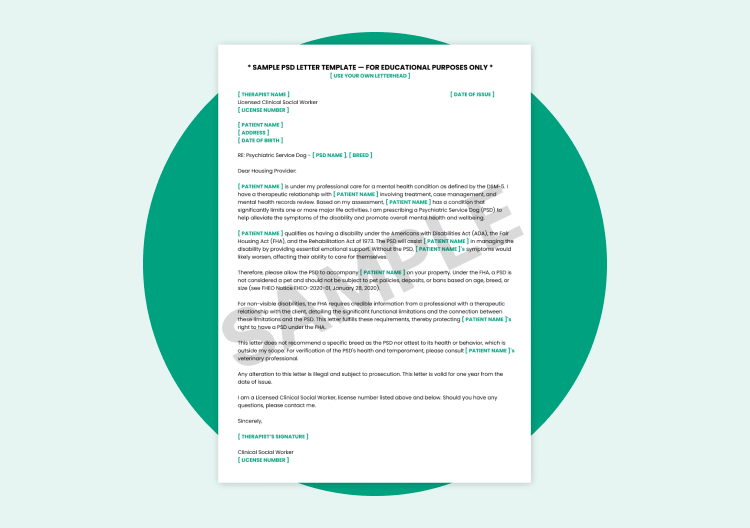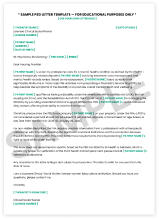ESA Documentation: Guidelines for Housing and Legal Compliance

An ESA provides therapeutic benefits to individuals with mental conditions like PTSD and anxiety. Under the Fair Housing Act (FHA), ESAs have legal rights to housing accommodations.
This means housing providers must allow ESAs to live with their owners, even in places with a “No Pets” policy.
The Americans with Disabilities Act (ADA) applies to service animals, granting them access to public spaces. However, ESAs are not covered under the ADA for public access but are protected for housing under the FHA.
To exercise these rights, tenants must provide valid ESA documentation. This typically includes an ESA letter from a licensed mental health professional. A legitimate ESA letter helps landlords verify the tenant’s need for the animal while ensuring compliance with housing laws.
Understanding Emotional Support Animal (ESA) Documentation
ESA documentation is a vital tool for housing and disability accommodations. It enables tenants to legally request housing accommodations under the FHA.
Showing an ESA letter also protects against unnecessary pet fees or restrictions. ESA documentation also helps housing providers verify a tenant’s need for an ESA due to a mental disability.
What is ESA Documentation?
ESA documentation is proof issued by a licensed mental health professional (LMHP). It confirms an individual’s need for an ESA due to mental or emotional disorders. An ESA letter is the most common form of documentation.
It must include the LMHP’s name, license number, and signature. The letter states that the individual has a disability that limits one or more major life activities. It confirms that the ESA provides emotional support and comfort.
It’s important to note that an ESA letter is not a license or certification for the animal. Emotional support animals are not required to undergo formal training like service animals.
Why is Proper Licensed Mental Health Professional ESA Documentation Important?
An ESA letter provided by an LMHP is essential to access legal rights provided under the FHA. According to the FHA, landlords and housing providers cannot deny someone housing based on their need for an ESA. They must allow the ESA to live with the tenant.
Valid ESA documentation is a formal record that confirms the need for an ESA. It explains that the animal is not merely a pet but is crucial for an individual’s emotional well-being. The letter helps ensure compliance with legal standards.
With a proper ESA letter, tenants can live with their ESA, even in housing with pet restrictions. Proper ESA documentation allows tenants to request a waiver for pet fees, deposits, and breed or size restrictions.
Emotional Support Animals are Exempt from Pet Fees
According to the FHA, Emotional Support Animals and Service Dogs are exempt from any housing pet fees, deposits or pet rents.
ESA Documentation Regulations and Federal Laws
ESAs are protected under the Fair Housing Act (FHA) for housing accommodations. The FHA requires tenants to provide a valid ESA document to request reasonable accommodations. This allows ESAs to live with their owners, even in housing with “No Pets” policies.
The U.S. Department of Housing and Urban Development (HUD) provides clear guidelines on how landlords must handle ESA accommodations. The Americans with Disabilities Act (ADA) applies to assistance animals but does not grant public access rights to ESAs.
Unlike service animals, ESAs are only protected for housing under the FHA. They are prohibited in public areas like restaurants, stores, or other non-housing spaces. Some states add their own regulations for ESA documentation.
In California, ESA letters must be issued by an LMHP who has treated the individual for at least 30 days before issuing the letter. This rule helps prevent misuse of ESA documentation.
In Florida, landlords are allowed to request extra proof of the ESA. This may include confirmation of how the animal supports the tenant’s disability and verification from an LMHP. These rules ensure compliance and protect against fraudulent claims.
Fair Housing Act (FHA) and ESA Protections
The FHA is a federal law that protects individuals with disabilities from discrimination in housing. It requires landlords to provide them with reasonable accommodation. This includes allowing them to live with their ESAs, even in housing with “no-pet” policies.
Under the FHA, landlords cannot charge extra pet fees or deposits for ESAs. They cannot restrict ESAs based on the animal’s breed, size, or weight. However, to exercise these rights, tenants must provide valid ESA documentation that meets FHA requirements.
According to FHA, a licensed mental health professional provides a valid ESA letter. The letter should confirm that the tenant has a qualifying mental illness or disability. It should also state that the ESA is necessary to ease symptoms of the disability.
A legitimate ESA letter consists of the licensing information and signature of the LMHP. It also includes the name of the individual with the disability. Tenants are not required to disclose their medical condition or provide detailed medical records.
Americans with Disabilities Act (ADA) Considerations
The ADA protects people with disabilities from discrimination. It defines the rights of support animals, specifically service animals and PSDs. According to the ADA, service animals are dogs specially trained to work or perform tasks related to a person’s disability.
These tasks can include guiding a blind person, alerting a deaf person to sounds, or pulling wheelchairs for people with physical disabilities. Under the ADA, service animals can go to all public places with their owner. Businesses cannot deny them access or ask for extra fees.
Unlike service animals, ESAs don’t have public access rights under the ADA. The ADA doesn’t recognize ESAs as service animals because they are not formally trained to perform specific tasks.
HUD Guidelines for Emotional Support Animal Documentation
HUD is a federal agency responsible for enforcing the Fair Housing Act. It provides regulations and guidance to ensure that housing providers and tenants.
The HUD helps them understand their obligations and rights under the FHA. It provides detailed guidance on ESA accommodations and ESA letter requirements under the FHA.
Key HUD requirements for ESA letters include:
- The letter must be written by a licensed healthcare professional. The LMHP can be a psychologist, therapist, psychiatrist, social worker, doctor, or registered nurse.
- The ESA letter must include the signature, contact details, and licensing information of the LMHP.
- The letter must specify the individual’s need for an ESA. It should state that the ESA is necessary to manage a mental or emotional disability.
Who Can Provide ESA Documentation?
Professionals who issue ESA letters must be licensed mental health practitioners. Their license must be valid and recognized in the state where they work.
Before providing an ESA letter, the professional must evaluate the person’s need for the animal. They also confirm that the animal helps with specific mental health symptoms.
Some services offer fake ESA documentation. To avoid scams, always check that the ESA letter is real. Make sure to verify the professional’s license and credentials.
Qualified Licensed Mental Health Practitioners
A valid ESA letter must come from a licensed mental health professional. These professionals include psychologists, psychiatrists, therapists, clinical social workers, licensed professional counselors, and nurse practitioners.
The LMHP must be qualified to diagnose and treat mental health disorders. Before issuing an ESA letter, they should thoroughly assess the individual’s mental health condition and their need for an ESA. Always ensure the professional issuing the letter is licensed and has a crucial role in your care.
Spotting Fake ESA Providers
Many online services provide fake ESA letters. These letters have no legal value. To avoid ESA scams and fake ESA letters, look for the following red flags:
- Fake providers provide instant ESA letters without connecting you with an LMHP. Always ensure you get a letter from an LMHP after they assess your mental health condition.
- A fake ESA letter lacks the LMHP’s credentials. If the letter is missing the LMHP’s license number, contact information, and signature, it’s not valid.
- Beware of online services that claim to provide ESA “certifications” or “registrations.” An ESA letter is the only document required for housing accommodation. The FHA doesn’t require ESA owners to register their ESA or get any ESA certification.
Requirements for a Legitimate ESA Letter
A valid ESA letter must include the licensed professional’s name, license type, license number, and the state where they are licensed. It should also have the individual’s name and a statement confirming their need for an ESA.
The letter must explain how the animal helps with the individual’s condition. It should be dated, signed by the professional, and printed on official letterhead. ESA letters must be renewed every year to remain valid.
Emotional Support Animal Letter Components
A valid ESA letter has certain components that differentiate it from a fake one. A valid letter is clear and detailed. Here are the key elements of a valid ESA letter:
- Full name and certain personal details of the individual requesting the letter.
- A statement confirming the patient’s mental or emotional disability.
- A description of how the ESA alleviates the symptoms of the diagnosed mental disability. It can include how an ESA helps reduce feelings of depression or manage PTSD symptoms. This confirms the individual’s need for an ESA.
- It must also include the healthcare provider’s license information and contact information.
- The letter must be issued on the LMHP’s official letterhead and include the LMHP’s signature.
Renewing ESA Letters Annually
ESA letters are not permanent. Some states, such as Arkansas, require ESA letters to be updated annually. Renewing your letter allows you to exercise your housing rights without any issues.
Many landlords often request an up-to-date ESA letter when you sign a new lease. This helps them ensure that the tenant’s mental condition still qualifies for an ESA. The renewal also confirms that the healthcare provider is still treating the individual.
Annual renewal also helps landlords avoid fraudulent claims. They can ensure that documentation is up-to-date and that a licensed mental health professional issued the ESA letter.
Obtaining ESA Documentation: Is it Safe to Get an ESA Letter Online?
Various online services provide ESA letters. However, not all services are legitimate. Many services provide fake letters without consultation with a licensed professional.
However, various online services that provide legitimate ESA letters also exist. These services connect you with an LMHP with a valid license. The LMHP first analyzes your mental condition. They issue an ESA letter if your mental health condition qualifies for an ESA.
Step-by-Step Guide to Getting an ESA Letter for Housing
Getting an ESA letter for housing is an easy process. Here are common steps to get a legitimate ESA letter for housing from an online service:
Is ESA Pet a Legitimate Platform for ESA Documentation?
Yes. ESA Pet is a legitimate online provider of ESA and Psychiatric Service Dog (PSD) letters. It is trusted by more than 12,000 ESA and PSD owners. ESA Pet makes obtaining a legitimate ESA letter easy with a simple 3-step process. It offers a free pre-screening to assess your eligibility for an ESA.
Based on pre-screening, ESA Pet connects you to an LMHP for a consultation. If the LMHP determines you need an ESA for your mental condition, they’ll issue a fully compliant ESA Letter. Once approved, you’ll get your letter within 24-48 hours.
Submitting ESA Documentation for Housing Requests
Tenants need to provide ESA documentation to request housing accommodations to live with their ESA. Tenants must follow a specific process for submitting ESA documentation to housing providers. Landlords have certain responsibilities to ensure a smooth process.
Tenant’s Responsibilities
As a tenant with an ESA, you must follow certain responsibilities to ensure smooth communication with housing providers. Submitting proper documentation and responding to inquiries is essential. A tenant requesting an ESA accommodation must fulfill the following obligations:
- Submit the ESA letter to the housing provider when you request accommodation.
- Respond to inquiries from the housing provider about the legitimacy of the ESA letter.
- Provide a complete ESA letter with the LMHP’s license details, the condition being treated, and how the ESA helps ease it. Missing information may delay approval.
Landlord’s Role in Reviewing ESA Requests
Landlords have certain responsibilities when reviewing requests for ESAs. They must carefully review the ESA letter to ensure it meets the legal requirements. The letter should be from a qualified licensed mental health professional (LMHP).
If the documentation seems unclear, landlords may ask for extra details from the tenant. They may also seek clarification from the tenant’s healthcare provider.
However, landlords should only request the necessary details related to the ESA. They should avoid asking for unnecessary details. These include inquiries about the tenant’s diagnosis or treatment plan.
Common Challenges and Solutions for ESA Handlers
ESA owners often encounter challenges when requesting accommodations or submitting documentation. For example, a landlord may reject an ESA request for housing accommodation. Landlords may also question the legitimacy of the provided ESA letter.
Denied Emotional Support Animal Requests
If your ESA request is denied, you can take certain steps to address the situation. These include:
- You can appeal the decision by contacting the housing provider or reviewing the reasons for the denial. Request clarification on the specific reasons and provide any missing or corrected information.
- You can submit extra documentation if the housing provider finds that ESA documentation is insufficient. Always ensure your ESA documentation is complete, valid, and up to date.
- You can consult a legal advisor if you believe your ESA request was denied due to discrimination. The advisor will help you understand your options, such as filing a complaint with the HUD.
Identifying and Avoiding Common Documentation Errors
When submitting ESA documentation, it’s crucial to ensure it is complete and the details are correct. Here are some key points to remember to avoid common documentation errors:
- Ensure that the ESA letter clearly states your diagnosis and how it qualifies for ESA support. Vague or unclear language can lead to confusion or rejection of the request.
- The letter should specify how the ESA alleviates the symptoms of your mental condition. Make sure it includes a detailed description of the ESA supporting your mental health.
- Ensure an LMHP issues the letter. Make sure the provider’s credentials are valid and up-to-date.
Comparison: ESA Documentation vs. Service Animal Documentation
ESAs and service animals differ in terms of legal protections and documentation requirements. Service dog owners don’t need to provide any documents proving their need for service animals.
The ADA and FHA prohibit businesses and landlords from requesting service dog documentation to grant public access and housing rights.
In contrast, ESA owners must provide ESA documentation or a letter for housing accommodation. ESAs don’t have public access rights under the ADA. Owners cannot take their ESAs to public places, even if they have legitimate ESA letters.
Legal Protections for ESAs vs. Service Dogs
ESAs and service dogs have different legal protections regarding housing, travel, and public access rights. Under the FHA, both ESA and service animals have housing accommodation rights.
ESA owners need to provide an ESA letter for housing accommodation. Service dog owners don’t have to provide documentation. However, having a service dog letter can make the housing accommodation process easier.
Regarding travel rights, service dogs are protected under the Air Carrier Access Act (ACAA). They can travel with their owners in the cabin, and airlines cannot charge extra fees.
ESAs are no longer protected under the ACAA. The individual airline’s pet policies apply to ESAs. These include extra pet fees and documentation like ESA letters and vaccination records.
Under the ADA, service animals have public access rights. They can go with their handlers to all public places. ESAs don’t have these rights.
FAQs on ESA Documentation
What Is Proper Documentation for an ESA?
Proper ESA documentation is a legitimate ESA letter issued by a licensed mental health professional. It should consist of a statement confirming the patient’s mental disability. A proper ESA letter also consists of the LMHP’s credentials and signature.
What Makes a Legitimate ESA Letter?
A legitimate ESA is issued by an LMHP. It verifies the individual’s need for an ESA to support a mental or emotional disability. It includes the LMHP’s credentials, licensing number, and signature.
How to Present an ESA Letter to a Landlord?
You can present your ESA Letter by providing a hard copy or a digital copy, as requested by the landlord. Ensure your ESA letter is up-to-date and includes all required components, such as the LMHP’s credentials.
What Is an ESA Certificate?
Online services usually market an ESA certificate as a quick and easy way to “register” or “certify” your pet as an ESA. However, it has no legal value. An ESA letter is sufficient to request housing accommodation.
Conclusion: Importance of Accurate ESA Documentation
ESA documentation helps ESA owners exercise their housing accommodation rights under the FHA. By showing a legitimate ESA letter, tenants can live with their ESAs even in housing with no pets policies.
A legitimate ESA letter comes from an LMHP. It confirms an individual’s need for an ESA and describes how the ESA helps deal with a mental condition.
To get your valid ESA letter, consult a qualified professional and have your mental condition assessed by them!

Dogs, Emotional Support Animal
Service Dog for ADHD and Its Life-Changi...
Andre Gregatti
Sep 6 2024

Emotional Support Animal, Housing
When To Tell the Landlord About Your Emo...
Andre Gregatti
May 13 2022

Dogs, Emotional Support Animal
Pet Insurance Coverage: What Pet Insuran...
Andre Gregatti
Sep 17 2024

Dogs, Emotional Support Animal, Housing, Travel
ESA Paperwork for Dog: Guide to Requirem...
Jonalyn Dionio
Jan 16 2025





